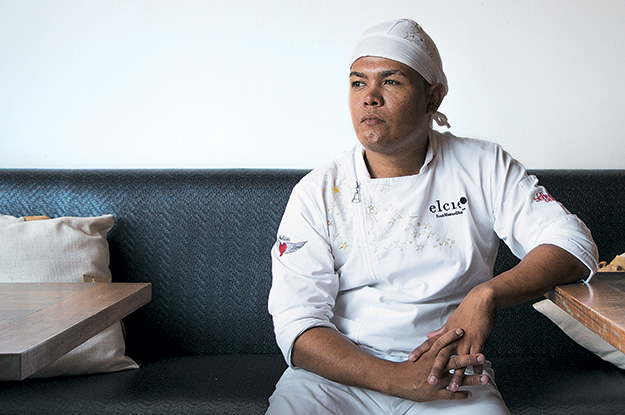This article is adapted from the Fall 2015 print edition of Americas Quarterly. To subscribe, please click here
Elcielo, in Medellín, stands out for more than the quality of its food. One of Latin America’s top 50 restaurants, it has also become a symbol of Colombia’s efforts to return to normalcy after more than five decades of conflict. For the past seven years, elcielo for Everyone, the foundation established by restaurant owner Juan Manuel Barrientes, has been offering cooking courses and employment opportunities to wounded army veterans.
If diners stepped into the kitchen, they would discover that elcielo has also become a powerful example of reconciliation. Since May, Rubén Darío Romero, 27, a former soldier who lost his left eye and part of his right leg to a land mine explosion, has been working shoulder-to-shoulder with a demobilized guerrilla from the Revolutionary Armed Forces of Colombia (FARC) — the group responsible for that explosion.
Romero works beside “María,” a 31-year-old ex-FARC combatant (whose real name has been changed) — and neither seems fazed.
Barrientes launched elcielo’s namesake foundation in 2008, shortly after the restaurant opened, and began training and hiring former soldiers. In late 2013, Barrientes sought Romero’s approval before expanding the program to demobilized guerrillas.
“They are also victims,” explains Romero. “Many have been obligated to join up, others because they wanted to. But I know that I can forgive, and we can work together to create a friendship from that point on.”
Hiring ex-combatants from the other side seemed like a bigger leap. But in 2014, elcielo connected with the Colombian Agency for Reintegration (ACR), a state agency that helps ex-combatants to study, work through traumas, and find employment. Four former guerrillas have worked at elcielo, thanks initially to the Colombian Family Welfare Institute and an eventual partnership between the foundation and ACR.
For the soft-spoken María, work inside one of the continent’s most famous gourmet spots has changed her perspective on life.
“In this space you feel a tranquility and a certain level of peace,” she says. “It’s so different from being in the jungle, always having to be alert, not knowing if you are going to come face-to-face with the army.”
María’s path to a normal civil life, however, continues to be complex. Her three years in the FARC were spent in the remote jungles of Urabá, a region in northwest Colombia heavily affected by the armed conflict. Since fleeing the group in 2012, María continues to receive threats from right-wing paramilitary groups, which has caused her to relocate to Medellín and keep her identity a secret.
Sharing a kitchen with former combatants changed Romero’s outlook as well. It was hard at first, he says, but the experience has helped him grow and live a “sweeter life.”
A restaurant alone is not likely to reverse the discrimination, fear and distrust many Colombians feel for the demobilized guerillas, and therefore elcielo doesn’t disclose to staff upon hiring whether a new employee is an ex-guerrilla. But as Romero and María discovered, reconciliation takes place one step — or one meal — at a time. “Seeing someone (Romero) so affected by acts of the FARC, a group that I was a part of, was not easy,” says María, who hesitated before finally telling her coworker about her history.
“He simply told me not to worry. Even now he always asks after me, how I’m doing, how I’m feeling, and he gives me a lot of encouragement,” she says with a soft smile.
Romero now splits his time between teaching other wounded veterans new skills at the foundation’s workshops and his kitchen duties. But his six-day work week is a new anchor to a life that was once defined by violence. The restaurant’s name (el cielo translates as “heaven”), for him, is the whole point.
“We are cooking Colombia’s peace here,” he says. “For me (the restaurant) is heaven, not only because of the food, but because of the social work being done.”
—
VELA Colectivo is an investigative journalism and photography collective based in Medellín, Colombia, that looks to expand perspectives on the country’s social issues through in-depth storytelling.





